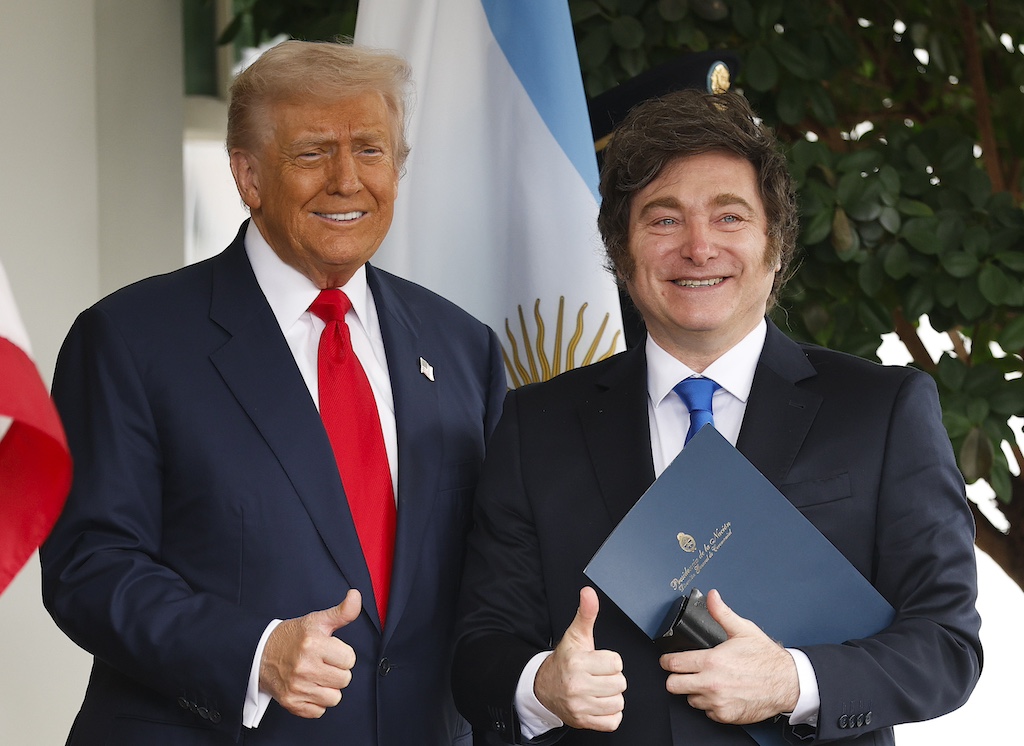Donald Trump Is Bailing Out Javier Milei’s Austerity Regime
As Washington shuts down and safety nets vanish, Donald Trump is sending billions to rescue Argentina’s far-right government. Argentine pensioners, driven into poverty by Javier Milei’s cuts, are in the streets demanding survival.

Assistance to Argentina fits into a broader project of social services cutbacks championed by Donald Trump, Javier Milei, and international outfits like the IMF and World Bank. (Kevin Dietsch / Getty Images)
Argentine president Javier Milei had a lot to celebrate during his recent visit to Washington, DC.
While Americans deal with an ongoing government shutdown, mass federal firings, and looming safety net cuts that could plunge millions into poverty, the Trump administration pledged $20 billion to bail out Argentina’s flailing economy.
The timing couldn’t be better for Milei as he faces down an election later this month where economic distress is threatening to tank his party’s chances.
The massive infusion of dollars might calm some investors, but for Argentina’s working class the deal looks like another cynical political ploy in a long legacy of harmful foreign bailouts. President Donald Trump’s warning that the investment might not go through if “a socialist or a communist wins” in Argentina’s upcoming elections all but confirms the political motivations behind the bailout.
Austerity Across the Hemisphere
The United States wants news of the bailout to “calm the economic crisis and help politically so that there’s a relatively favorable result for the government that allows Milei to pursue structural reforms,” explains Julio Gambina of the National Coordinating Roundtable of Organizations of Retirees and Pensioners of the Republic of Argentina.
In the lingo of international finance, “structural reforms” or “structural adjustments” generally refer to privatization and significant cuts in social spending and public programs.
Milei’s tenure has been disastrous for Argentina’s pensioners. His structural adjustments have left the country’s retirees with an average monthly pension of around 385,000 pesos — roughly $280. That’s below the poverty line and, studies suggest, just a third of the amount needed to cover basic necessities. Almost 20 percent of Argentina’s older adults have to work to subsist.
Cutbacks have also affected the country’s public health insurance for the elderly, PAMI, which no longer covers 100 percent of the cost of many necessary medications, despite workers paying into the program their whole careers.
The Institute for Policy Studies, my organization, recently recognized the Argentine retirees group with its yearly Letelier-Moffitt Human Rights Award for standing up to austerity. Accepting the award on behalf of the organization was Marcos Wolman, a longtime leader in the movement who turns ninety in November.

They didn’t start this fight with Milei though — their origins go back to austerity fights of the early 1990s. In fact, while three of their representatives received the award in DC, the rest of the organization was out front of the Argentine Congress participating in their weekly Wednesday protests — now numbering over 1,750.
The protests have been met with surprising levels of repression considering the age of most participants. A 2023 government protocol gave federal security forces, normally tasked with patrolling borders, the green light to use tear gas and rubber bullets to disperse protesters. The retirees who spoke with me shared that some of their comrades in their eighties have been beaten back with batons.
But under Milei, these protests have become about much more than retirees, because the harms of his cuts don’t end there. For example, earlier this year, Milei eliminated pensions for 110,000 disabled Argentines unable to get into the system through working. Another law stripped subsidized access to public transportation, therapy, and education for people with disabilities.
The Cavalry Arrives
These social spending cutbacks did make some conventional economic indicators improve. In 2024, a 5 percent fiscal deficit from the year prior turned into a 0.3 percent surplus. Inflation has also fallen to under 40 percent. Of course, the austerity responsible for those improvements came at the expense of spending on education, housing, and retirees.
And after poor results for Milei’s party in Buenos Aires elections, investors started to get anxious that Milei would not be able to carry out his austerity plans. Then the cavalry came in.
Treasury Secretary Scott Bessent announced on X in early October that the United States would provide a $20 billion currency swap line with Argentina’s central bank, essentially trading stable American dollars with volatile pesos. Bessent later suggested the administration was considering doubling this amount to $40 billion by tapping private sources. This combined government and private effort has raised concerns that investors are taking advantage of Argentina’s crisis to pillage natural resources.
“It is not just a commitment by the American government but by the private sector of the American economy that is interested in Argentina’s energy, land, drinking water, minerals — all of which are associated with artificial intelligence innovation,” Gambina explained.
But the United States is not the only Western power intervening to keep Milei’s libertarian agenda afloat. In April, the International Monetary Fund (IMF) approved a $20 billion loan, on top of the $43 billion that Argentina still owes.
Argentina has a long history with the IMF, which it formally joined in September of 1956. The deal in April was the twenty-third assistance package to Argentina, solidifying its status as the largest borrower from the institution. The over $60 billion owed by Argentina is almost four times that of the second-largest IMF borrower, Ukraine, a country in the middle of an extended war.
These funds have done little to help the people of Argentina. “That money will enter the Central Bank of Argentina, but it will only serve for capital flight,” Gambina said. The money from the US, for example, is likely to handsomely enrich Bessent ally and billionaire hedge fund manager Rob Citrone, a huge investor in Argentinian bonds and stock.
Western powers aren’t shy about the political motivations behind these bailouts. In 2020, Mauricio Claver-Carone, a Trump advisor on Latin America who served as America’s executive director at the IMF, said that “everything Trump did at the IMF was to assist [conservative Argentine president Mauricio] Macri and prevent Peronism from returning to the Casa Rosada.”
“This Debt Cannot Be Paid”
Beyond the political benefits, the assistance to Argentina fits into a broader project of social services cutbacks championed by Trump, Milei, and international outfits like the IMF and World Bank.
The money from the IMF comes with strings attached — conditionalities — that functionally require austerity. These conditionalities have dictated Argentina’s structural adjustments program since the fund gave it $45 billion in 2018. Between Milei’s election in 2023 and the end of 2025, according to an analysis by the Bretton Woods Project, social spending fell by 17 percent while environmental programs were gutted.
At the same time, payments to creditors saw public debt decrease by 21 percent and state security budgets ballooned. “This reveals a hierarchy of priorities: creditors first, people and ecosystems last,” the analysis concludes.
“The debt to the IMF is a permanent conditioner of the economic, social and political life of our country,” said Wolman, the nearly ninety-year-old pensioner. “This debt cannot be paid, it’s an unpayable debt, regardless of what adjustments they make,” Wolman said.
The pensioners group says that it’s long past due for Argentina to reconsider its foreign debt. Not only should the country reject new loans but the retirees support suspending external debt payments and conducting an investigation about the source of debt to determine whether it’s legitimate.
They should be joined in opposition by groups from the United States, whose own Treasury is now being tapped — in a time of austerity, layoffs, and rising authoritarianism — to prop up a flailing far-right leader abroad.